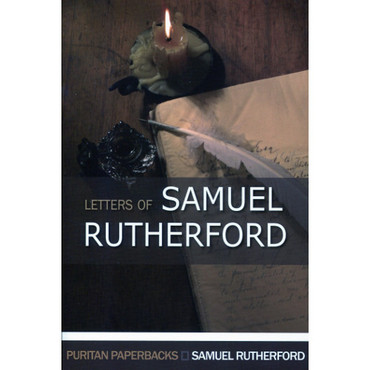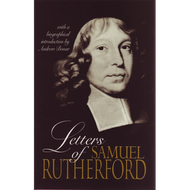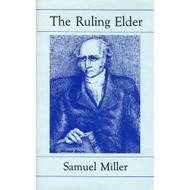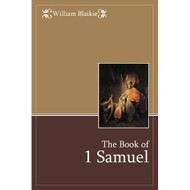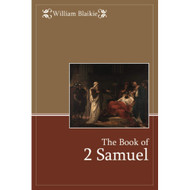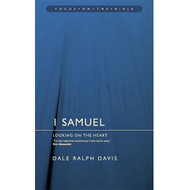Categories
Categories
The Letters of Samuel Rutherford by Samuel Rutherford
Product Description
Like John Bunyan in Bedford gaol, Samuel Rutherford did his best work while suffering imprisonment for the gospel.
His opponents had meant to silence him but instead they perpetuated his ministry through the centuries for it was out of this period that most of his famous Letters came. Addressed to high and low they were so prized by the recipients that the first collection by Robert McWard appeared in 1664 just three years after Rutherford’s death. the successive editions contained more letters until they grew to the 365 in Andrew Bonar’s classic edition.
From this, ‘the most remarkable series of devotional letters that the literature of the Reformed churches can show’, the great leaders in the Church as well as the humblest Christians have drawn strength. It is said of Robert Murray M’Cheyne that ‘the Letters of Samuel Rutherford were often in his hand.’ This abridged edition contains sixty-nine of these letters.
Table of Contents
| 1 | TO A CHRISTIAN GENTLEWOMAN | 13 |
| [On the death of a daughter] | ||
| 2 | TO MARION M’NAUGHT16 | |
| Submission, perseverance and zeal recommended | ||
| 3 | TO LADY KENMURE | 18 |
| God’s inexplicable dealings with his people well-ordered | ||
| 4 | TO MARION M’NAUGH | 20 |
| [In prospect of the Lord’s Supper] | ||
| 5 | TO MARION M’NAUGHT | 22 |
| The threatened introduction of the Service-Book | ||
| 6 | TO JOHN KENNEDY | 25 |
| Deliverance from shipwreck | ||
| 7 | TO LADY KENMURE | 29 |
| A union for prayer recommended | ||
| 8 | TO LADY KENMURE | 31 |
| [On the death of Lord Kenmure) | ||
| 9 | TO MARION M’NAUGHT | 33 |
| The prospect of exile in Aberdeen | ||
| 10 | TO LADY KENMURE | 34 |
| [On the eve of banishment to Aberdeen) | ||
| 11 | TO LADY CULROSS | 37 |
| [On the occasion of banishment to Aberdeen) | ||
| 12 | TO ROBERT CUNNINGHAM | 39 |
| Consolation to a brother in tribulation | ||
| 13 | TO ALEXANDER GORDON | 42 |
| Rutherford’s feeling upon leaving Anworth | ||
| 14 | TO LADY KENMURE | 43 |
| Rutherford’s enjoyment of Christ in Aberdeen | ||
| 15 | TO HUGH M’KAIL | 49 |
| Christ to be trusted amid trial | ||
| 16 | TO MARION M’NAUGHT | 47 |
| Comfort under tribulations | ||
| 17 | TO JOHN GORDON, ELDER | 48 |
| Will Christ at all hazards | ||
| 18 | TO ROBERT BLAIR | 52 |
| God’s arrangements sometimes mysterious | ||
| 19 | TO ROBERT GORDON | 55 |
| Visits of Christ | ||
| 20 | TO LADY KENMURE | 58 |
| None worthy but Christ | ||
| 21 | TO DAVID DICKSON | 59 |
| God’s dealings | ||
| 22 | TO ALEXANDER HENDERSON | 61 |
| Sadness because Christ’s Headship not set forth | ||
| 23 | TO JOHN GORDON, YOUNGER | 63 |
| Reasons for being earnest about the soul | ||
| 24 | TO MARION M’NAUGHT | 65 |
| Adherence to duty amidst opposition | ||
| 25 | TO WILLIAM LIVINGSTONE | 66 |
| Counsel to a youth | ||
| 26 | TO THB LAIRD OF CARLETON | 67 |
| Increasing sense of Christ’s love | ||
| 27 | TO JOHN FLEMING | 70 |
| Directions for Christian conduct | ||
| 28 | TO LADY BOYD | 73 |
| Lessons learned in the school of adversity | ||
| 29 | TO JOHN STUART | 76 |
| Commercial misfortunes | ||
| 30 | TO DAVID DICKSON | 81 |
| Christ’s infinite fulness | ||
| 31 | TO JOHN CLARK | 83 |
| Marks of difference between Christians and | ||
| 32 | TO EARLSTON, YOUNGER | 84 |
| Dangers of youth | ||
| 33 | TO WILLIAM DALGLEISH | 90 |
| Fragrance of the ministry | ||
| 34 | TO JOHN STUART | 94 |
| Hope for Scotland | ||
| 35 | TO EARLSTOH, YOUNGER | 97 |
| Sufferings | ||
| 36 | TO WILLIAM GORDON | 101 |
| Testimony to Christ’s worth | ||
| 37 | TO JOHN HENDERSON | 104 |
| Practical hints | ||
| 38 | TO ALEXANDER COLVILL | 105 |
| Regrets for being silenced in ministry | ||
| 39 | TO JAMES HAMILTON | 106 |
| Suffering for Christ’s Headship | ||
| 40 | TO PARISHIONERS OF ANWOTH | 109 |
| Protestation of care for their souls and for the glory of God | ||
| 41 | TO LADY KILCONQUHAR | 118 |
| The interests of the soul most urgent | ||
| 42 | TO LORD CRAIGHALL | 123 |
| Standing for Christ | ||
| 43 | TO HUGH M’KAIL | 126 |
| The Law | ||
| 44 | TO FULK ELLIS | 128 |
| Friends in Ireland | ||
| 45 | TO JAMBS LINDSAY | 131 |
| Desertions and their use | ||
| 46 | TO JAMBS HAMILTON | 135 |
| Christ’s glory not affected by his people’s weakness | ||
| 47 | TO LADY GAIT GIRTH | 137 |
| Christ all example in Cross-bearing | ||
| 48 | TO MARION M’NAUGHT | 139 |
| Prospects of his ministry | ||
| 49 | TO JAMES BAUTIE | 140 |
| Spiritual difficulties resolved | ||
| 50 | TO THOMAS CORBET | 147 |
| Godly counsels | ||
| 51 | TO WILLIAM GLENDINNING | 148 |
| Sweetness of trial | ||
| 52 | TO MARION M’NAUGHT | 150 |
| A Spring-tide of Christ’s love | ||
| 53 | TO JOHN GORDON | 152 |
| Heaven hard to be won | ||
| 54 | TO PARISHIONERS OF KILMALCOLM | 155 |
| Spiritual sloth | ||
| 55 | TO ALEXANDER LEIGHTON | 163 |
| Christs’ prisoner in bonds at London | ||
| 56 | TO JAMES WILSON | 166 |
| Advices to a doubting soul | ||
| 57 | TO DAVID DICKSON | 171 |
| [On the death of a son] | ||
| 58 | TO LADY BOYD | 173 |
| Proceedings of tile Westminster Assembly | ||
| 59 | TO LADY KENMURE | 175 |
| Westminster Assembly Religious sects | ||
| 60 | TO J.G. | 176 |
| Depression in a cloudy day | ||
| 55 | TO WILLIAM GUTHRIE | 178 |
| Depression under dark trials | ||
| 56 | TO LADY RALSTON | 179 |
| Duty of preferring to live rather than die | ||
| 63 | TO LADY KENMURE | 183 |
| Trials | ||
| 64 | TO JAMES DURHAM | 185 |
| [On his deathbed] | ||
| 65 | TO JAMES GUTHRIE, ROBERT TRAILL and other brethren imprisoned in Edinburgh Castle | 186 |
| On suffering for Christ | ||
| 66 | TO MISTRESS CRAIG | 188 |
| [On the death of her son] | ||
| 67 | TO JAMES GUTHRIE | 190 |
| Steadfastness under persecution | ||
| 68 | TO ROBERT CAMPBELL | 192 |
| Steadfastness in protest against prelacy and popery | ||
| 69 | TO BRETHERN IN ABERDEEN” | 194 |
| Sinful conformity and schismatic designs reproved | ||
| BRIEF NOTES ON RUTHERFORD’S CORRESPONDENTS | 199 | |
| AN OUTLINE OF RUTHERFORD’S LIFE | 205 |
About the Author
Samuel Rutherford (1600–61) was born in the village of Nisbet, Roxburghshire, and educated at Jedburgh Grammar School and Edinburgh University (MA, 1621). From 1623 he acted as Regent of Humanity at the University, with responsibilities as a Latin tutor. There is a strong suggestion that 1624 was the date of his conversion, and he began reading theology at Edinburgh under Andrew Ramsay.
In 1627 he was settled as minister of Anwoth in Kirkcudbrightshire, and so began a ministry lasting only nine years, yet one ‘whose fragrance and power has left the name of Anwoth forever stamped on the hearts of Christian people’. In July 1636 the High Commission brought his ministry in Anwoth to an end because of his nonconformity, barring him from preaching in Scotland and exiling him to Aberdeen for the duration of the King’s pleasure. It was during his two years in Aberdeen that many of his much-loved Letters were written.
After the Covenanters’ revolution in 1638 Rutherford returned to Anwoth and was a commissioner to the Glasgow Assembly. The commission of that Assembly designated him Professor of Divinity at St Mary’s College, St Andrews. He consented to the office with the stipulation that he be permitted to preach regularly, and was made a colleague of Robert Blair in the city pulpit.
In 1643 Rutherford left for London as one of the Scottish Commissioners to the Westminster Assembly. He remained in the city four years, preached before the Long Parliament, took a prominent part in the Assembly’s debates on theology and Church polity, and published five major books. In his Lex, Rex (1644) Rutherford denied that a limitless sovereignty belonged to the King, and contended that the Crown is bestowed by the voluntary consent of the people, who are at liberty to resist a tyrant. In 1647 he resumed his duties at St Andrews and was soon made Principal of St Mary’s. In 1651 he became Rector of the University.
At the Restoration of Charles II in 1661 the Committee of Estates ordered the burning of Lex, Rex, deprived Rutherford of his offices, and cited him to come before Parliament to answer a charge of treason. Rutherford was already terminally ill and replied, ‘I have got summons already before a Superior Judge and Judicatory, and I behove to answer to my first summons, and ere your day come, I will be where few kings and great folks come.’ Death indeed intervened before the charge could be tried.
Endorsement
‘When we are dead and gone let the world know that Spurgeon held Rutherford’s Letters to be the nearest thing to inspiration which can be found in all the writings of mere men.’ — C.H. SPURGEON
‘Surprising though it may seem in a world of large books, of all those owned by our family this may be the one we have most often lent or quoted to friends.’ — SINCLAIR B. FERGUSON
Apart form the Bible, ‘such a book as Mr. Rutherford’s Letters the world never saw the like.’ — RICHARD BAXTER
 Loading... Please wait...
Loading... Please wait... 
